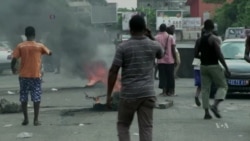Former Ivory Coast president Laurent Gbagbo went on trial Thursday at the International Criminal Court, facing charges of crimes against humanity.
Gbagbo is the first former head of state to be tried at the ICC, and human rights groups say his trial is a milestone in the search for justice for victims of war crimes. Some Africans, however, see the ICC as a tool of the West and argue the continent should have its own court.
In Abidjan, the trial is all over the news. "The Beginning of the End," reads the headline on a pro-government newspaper. "The Chances of Gbagbo and Blé Goudé," reads the headline on a different paper that favors the former head of state and his top aide.
In some neighborhoods, Gbagbo supporters have organized live broadcasts of the trial.
"I came to watch the trial of my president, said Basile Konan Dessi, adding "I hope he will be released, because there is no evidence against him."
The charges
The 70-year-old Gbagbo and Blé Goudé are charged with four counts of crimes against humanity, allegedly committed in 2010 and 2011 when Gbagbo supporters clashed with supporters of politician Alassane Ouattara over the results of the presidential elections. About 3,000 people were killed.
Eventually, Gbagbo was arrested and Ouattara became president. Ouattara was reelected last year.
The trial has rekindled criticism that the court is biased. Since its inception in 2002, the court in The Hague has prosecuted cases from eight countries, all of them African.
Some argue Gbagbo should be tried on the African continent, as in the case of former Chadian leader Hissène Habré, who is being tried by a special court in Senegal.
Boubacar Koné, acting spokesperson of a branch of Gbagbo’s party, the FPI, says the trial is unfair because pro-Ouattara individuals accused of crimes during the post-election violence are not being brought to justice.
"Here is a conflict in which only one camp is being prosecuted," he said.
Topic of conversation
Samassi, who owns a café in a popular Abidjan neighborhood, says the trial is the main topic among his customers these days.
He says he hopes the trial will shed light on atrocities committed during the crisis.
"I would like that justice be done on this matter," he said. "On Laurent Gbagbo, on the killings and the crimes committed, to call the attention of all Ivorian and also all African heads of state, because no crime must remain unpunished."
Drinking his morning coffee, Kakohi John Guié says his only hope is that the trial is peaceful.
"I think justice will decide and then the situation in Ivory Coast will be stable again," he said.
The trial is expected to last three to four years.






